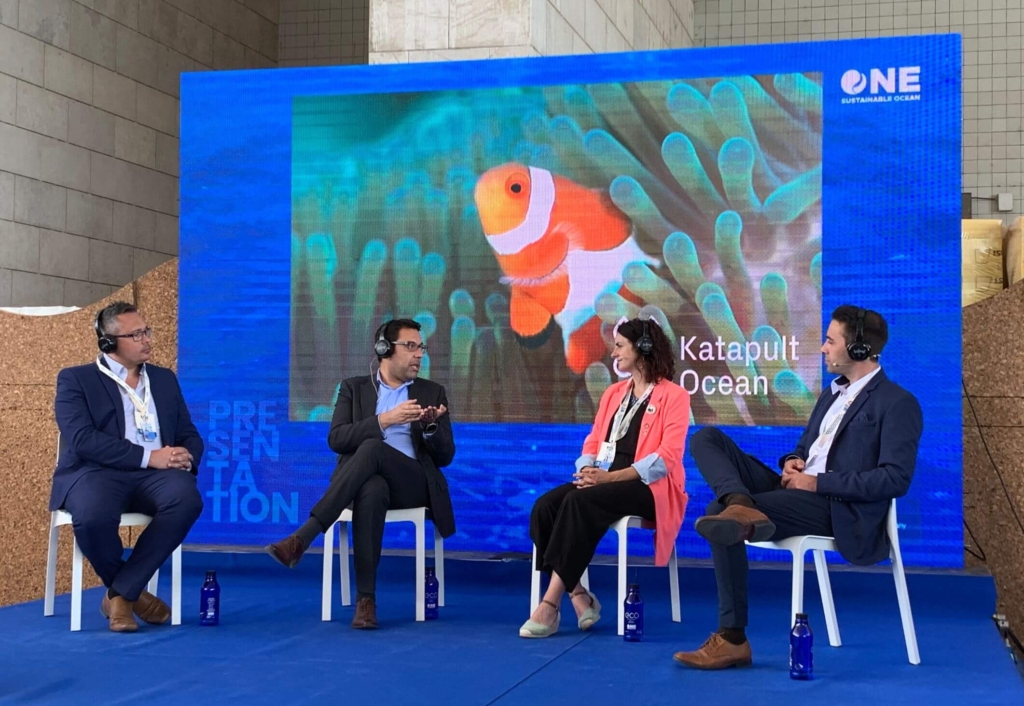UN Ocean Conference, Lisbon: ‘An Ocean Emergency’ and the rising wave of measurable impact.

Last week the Katapult team was in Lisbon to attend the UN Ocean Conference. After years of postponement, the conference offered the vital opportunity to address the now critical challenges facing our oceans and the pathway ahead. As our oceans face a multitude of risks, we stand committed to our model of ocean impact investment, proud of the solutions provided by our portfolio companies and privileged to announce the launch of the 1000 Ocean Startups impact reporting initiative, Ocean Impact Navigator.
With the gathering of politicians, scientists, activists, startups and investors, the sense of responsibility lies heavy. In his opening remarks to the conference, UN Secretary General, Anthony Guterres both acknowledged past failings and the need for a rapid re-positioning in our relationship to the ocean:
“Sadly, we have taken the ocean for granted and today we face what I would call an ocean emergency. We must turn the tide […] A healthy and productive ocean is vital to our shared future,”
The Challenge in figures
The sentiment shared by the Secretary General is one that is matched by an conclusive series of scientific facts, that taken together should raise a cross-societal alarm.
- By 2050 we are projected to have more plastic in the ocean than fish
- Over just 40 years there has been a decrease recorded in marine species of 39%
- Over 93% of the Great Barrier Reef has experienced coral bleaching
- Projected sea level rise has the capability to negatively impact 250 million people globally by 2100
What stands clear is that human inaction and misuse of our oceans has the ability to drastically alter all facets of our relationship with the natural world. It is against this backdrop that the impetus for change and innovation becomes all the more necessary.
The promise of Ocean Impact tech
During the conference there has been a renewed call to achieve UN Sustainable Development Goal 14: Life Below Water, that emphasizes the need to conserve and sustainably use the world’s oceans, seas and marine resources.
Alongside the political initiatives to control illegal fishing, minimize ocean acidification and better legislate plastic waste management, a growing space has been created for the role of developing and financing ocean-tech solutions.
It is in this space that Katapult Ocean, as a leading investor and accelerator of ocean impact technology that we see highly promising solutions and the ability to honor the commitments laid out by the United Nations.
At the core of our work, lies a belief that through investment in, acceleration and stewardship of the most impactful ocean technology, we can build a world where a thriving ocean stands in harmony with economic development.
Alongside being able to showcase the success and impact of Katapult’s model of investment, the conference offered the opportunity for us to reconnect with Katapult Ocean’s portfolio companies.
The learnings, trajectories and impact of our portfolio companies offer tangible examples of how innovation can not only mitigate damages inflicted upon our ocean but reposition our relationship to the ocean in a healthier, more sustainable and equitable fashion.
Reflective of the plurality of the threats to our ocean raised in Lisbon, so to do our portfolio companies who joined the UN Oceans Conference represent a plurality of solutions:
- ACUA Ocean
Provides long endurance, hydrogen-powered uncrewed surface vessels for monitoring and sustainable management of oceans and waterways. - Arc Marine
Arc Marine is disrupting the marine industry by accelerating reef creation in offshore construction projects - Atlan Space
Combats illegal fishing through artificially intelligent drones. - Brayfoil
Provides the next generation of wind turbine blades – that change shape to tailor loadings and respond better to incoming winds, enabling lighter blades, longer bladespans, and reducing the overall cost. - Fortuna Cools
Fortuna Cools produces coolers from coconut waste as an alternative to styrofoam coolers, avoiding coconut waste from being burnt and reducing the use of non-biodegradable styrofoam. - Gazelle Wind Power
Develops floating offshore wind power generation plants. - G-Kinetic
Produces tidal energy generation to offer clean, predictable energy from free flowing water, with minimal impact on the natural environment. - Ocean bottle
Each sold Ocean Bottle funds the collection of at least 1,000 plastic bottles in weight before they enter the ocean. - Oceanium
Develops innovative, all-natural products from sustainably-sourced seaweed. - Pinovo
Pinovo provides Clean and Circular Abrasive Blasting Method for Surface Treatment – stopping micro plastics from entering the Ocean. - Saathi Pads
Saathi Pads provide biodegradable & compostable sanitary pads that degrade within six months – 1200 times faster than plastic pads. - Umami Meats
Umami Meats is developing cultured seafood based on a proprietary, low-cost, and sustainable formulation of growth factors. - Undersee
Undersee facilitates intelligent collection of ocean data.
CEO in Katapult Ocean Jonas Skattum Svegaarden sais “Politicians, scientists, and investors are all looking for new technologies and innovations to be the solution to the challenges we urgently need to address. Acceleration of ocean impact startups and bridging the gaps between science, private and public capital, and innovators are key to reaching the goals within the ocean decade. Meeting face to face in Lisbon with all these key stakeholders leaves us energized and hopeful.”
Quantifiable Ocean Impact
In addition to the growing demand for the solutions of ocean impact tech, the conference voiced the need for a clearer and more uniform method for ocean impact reporting. Meeting this call, Katapult Ocean was delighted to participate in the launch of 1000 Ocean startups Ocean Impact Navigator.
Developed by 1000 Ocean Startups with support from SYSTEMIQ, the Ocean Impact Navigator is a new open-source impact KPI framework, designed to simplify, harmonize and strengthen impact measurement and reporting for the Ocean Impact Innovation ecosystem.
As part of the 1000 Ocean Startups Steering Committee, we are excited for the adoption of the Ocean Impact Navigator and its potential to strengthen the standard of ocean impact.
Commercial Manager in Katapult Ocean Ingrid Maurstad has been part of the working group;
“Measuring and managing impact is something everybody talks about, – and struggles with. It is no longer enough to say that you have a positive impact, you need to prove it as well. Through our accelerator program we spend almost one third of the program working on impact with the startups, securing that impact is core when the startups are scaling. In the 1000 Ocean Startups coalition we saw the need for developing a common KPI framework to measure the impact and aggregating the impact measurement on a portfolio level. The Ocean Impact Navigator is a great tool for that!”
Our work alongside 1000 Ocean Startups ties into Katapult’s broader commitment to understand the growing network and impact of ocean-tech. This year marks the launch of Katapult’s third Blue World Perspective report. As a part of our investment process, we have screened close to 2000 ocean startups and mapped the global landscape for impact-driven ocean startups. In the report we highlight some of the key challenges and sectoral trends within the Ocean impact space.
As the challenge mounts to protect and conserve the health of our Blue Planet we stand firm in our position to deliver positive and measurable impact. We leave Lisbon with a wealth of insight, a broadened network of like-minded individuals and a re-doubled commitment to help build a thriving world for all.
Learn more about The Ocean Impact Navigator
Learn more about Blue World Perspective

